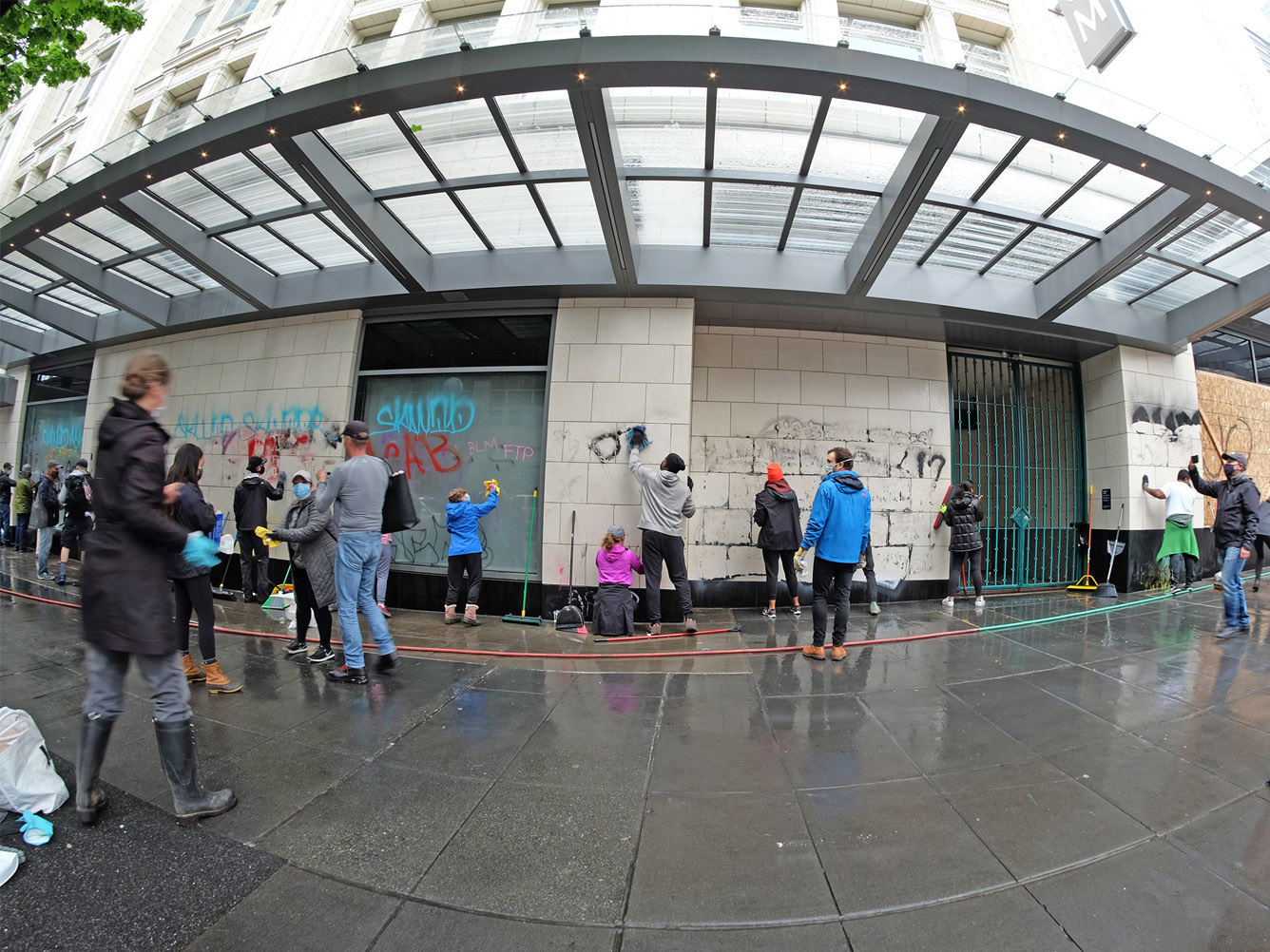News
Downtown core faces ‘stiff headwind’ to rebuild, recover
Posted on

This story was originally published by My Northwest on June 3, 2020.
Downtown Seattle has felt a lot of the weight of the protesting and the following loots and riots over the weekend, and into this week. Jon Scholes, the president and CEO of the Downtown Seattle Association — a nonprofit, membership-based organization that works to create a vibrant, healthy downtown — said his initial reaction to the destruction downtown was sadness and anger.
“I was sad and angry for a number of reasons. Sad and angry because there were thousands of folks that came downtown Saturday peacefully to express their grief, their anger, their belief in the great injustices that do exist in our community, in our country, and their grief for the murder of George Floyd,” Scholes told KIRO Nights. “And I was sad that their messages got hijacked by folks who came down for other purposes, intent on violence and destruction, and tore apart our downtown and really had their way for several hours, … putting lots of people’s lives at risk and creating an incredible amount of destruction.”
This destruction came at a time when businesses were already facing a tough economic challenge due to the COVID-19 pandemic. Much of the focus now is on how downtown will pick up and rebuild, Scholes said.
“Certain retailers and others were looking to Phase 2 and how they could reopen at some level and start planning for some amount of business activity,” he said. “Now that road is a little more difficult and a little longer as people pick up the pieces, literally, and put windows back in, and re-merchandise stores that were looted.”
Scholes said the downtown core faces a “really stiff headwind” to return and rebuild in the aftermath of both the destruction and hardships of the pandemic.
“But we’re committed to that,” he added. “We’re going to be engaged with the mayor and city leadership and the chief, and the retailers and property owners, focused on cleanup, recovery, restoring the peace to the heart of our city and bringing everybody together to work for a more just community and country.”
Scholes was moved by the number of volunteers that came from all corners of the region to help clean broken glass off the sidewalks, pick up trash, board up windows, and remove graffiti.
“I was having conversations with my staff on Saturday evening, and we were talking about organizing such an effort,” he said. “But before we were going to do that and put out a call, we wanted to make sure it was safe. So we didn’t put out any organized message, and we didn’t have to.”
People showed up on their own. Scholes said he was downtown early and there were already people who had come out well ahead of him with brooms, dust bins, and garbage cans.
“I think it shows how much people care about our downtown,” he said.
Scholes does hope that the city will learn from the events of this weekend and be able to respond differently, and better, in the future.
“I think we need to learn from this and learn from what was known, what resources were deployed,” he said. “How were they deployed? What strategies were used? Because clearly we lost this one as a city and they took control, … and that caused a lot of damage, destruction, costs, and put a lot of lives at risk, and it was very, very bad — it could have been much, much worse.”
Moving forward, the DSA plans to keep working to create a healthy downtown.
“I haven’t found a great city in the world that doesn’t have a great downtown. So in some ways it’s a requirement. If you want a great city and a thriving region, you’ve got to pay attention to your urban core,” Scholes said. “And that’s why we exist. That’s our mission, and we’re going to keep at it, and this is a steep hill with a stiff headwind. But the folks of downtown are resilient.”
Scholes says right now it’s time pick up the pieces, keep the peace, and focus on the next several days. Then, over the long term, the city will need a new set of strategies to make sure this destruction and violence does not happen again.
“We can’t send the signal that that is something that can take place in our in our city,” he said. “… We absolutely have to assess and learn.”
Scholes said the DSA has already met with the mayor, the police chief, and other local leaders to talk about what can be learned and how to help businesses recover. These conversations will continue, he said, as they figure out how to prevent acts like this and how to support the downtown core through the current economic crisis.
“Downtown’s really everybody’s neighborhood,” Scholes added. “We want people to come down and and and grieve and mourn, express their point of view and their voice. And that needs to continue to happen, but we need to draw a line and have a different set of tactics for those that come down just to put the lives of others and property at risk.”
“We can never, and should never, take for granted how fragile our urban cores and our downtowns are, particularly in the state of a pandemic,” Scholes said. “And with the real challenges in our country and in our community around inequality and inequity, and the real pain that people are feeling right now … I think we need to keep all that in mind, and focus on bringing the peace back to our city and getting our downtown back on its feet.”